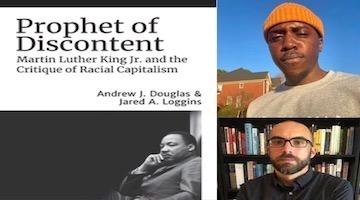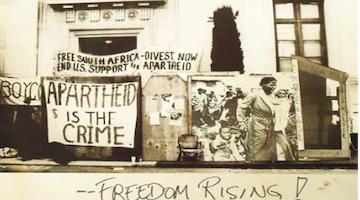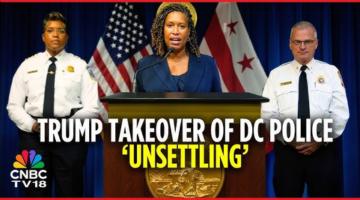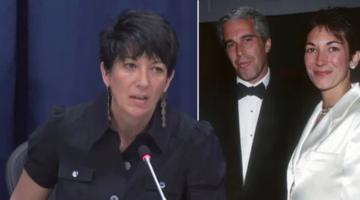Looting and rioting appear as immediately effective tactics in the struggle against whiteness, property and the police.
“The non-violent Civil Rights Movement we learn about in elementary school never really existed.”
In this series, we ask acclaimed authors to answer five questions about their book. This week’s featured author is Vicky Osterweil. Osterweil is a writer, editor, and agitator and a regular contributor to The New Inquiry. Her book is In Defense of Looting.
Roberto Sirvent: How can your book help BAR readers understand the current political and social climate?
Vicky Osterweil: We are not only in another period of escalating, rampant and open white supremacy, not merely witnessing a series of catastrophic economic, social and political crises, but are also living through one of the most widespread, popular and inspiring uprisings against the police, white supremacy and the American state in US history.
I hope this book helps people see why looting and rioting appear as immediately effective tactics in that fight, and to understand this current moment as a part of the long history of Black liberation struggle that has threatened to overturn settler-colonialist relations since the first Africans were kidnapped and brought across the Atlantic. I hope it can give readers a deeper understanding of the tactical, historical, and political wisdom imminent in the forms of direct action we are witnessing all across this country, to see the deep historical interconnections in both the formations of and the struggle against whiteness, property and the police, and to begin to think differently about the “proper” ways to organize, fight back, and imagine freedom.
What do you hope activists and community organizers will take away from reading your book?
Activists have a lot of bad habits and instincts that have been learned both from decades of a historic lack of mass struggle in the US, roughly from 1975-2011, (no disrespect is intended to the inspiring movements and fights that occurred in that period to point out they were often isolated within a generally reactionary atmosphere) as well as from the growth and power of the non-profit industrial complex and its funder-driven model of community organizing. I hope that this book helps them move away from the truisms developed in the period: that non-violence is the only way forward; that certain forms of organization are more legitimate or “actually political” than others; that the main results of activism should be judged at the ballot box or in reforms given by politicians; that campaigns work best when they are “single-issue”; that media messaging is the most important aspect of the campaign; that we should be focused on appealing to the average (read: white, suburban, middle class) American, etc. etc.
“Bad habits and instincts that have been learned from decades of lack of mass struggle, roughly from 1975-2011.”
Instead, I hope this book helps them embrace different forms of “organization” and struggle that have reappeared again and again in both the Black Freedom Movement and other movements across American history. I hope they can focus their study, understanding and solidarity on the Black movement as it actually moves and exists, rather than in the form that would best fit their theories. I hope this book helps organizers embrace what anarchists call a “diversity of tactics” that focuses more on how we can best protect, help and care for one another than on questions of movement respectability, appeal to the uninitiated, media coverage or non-violence.
We know readers will learn a lot from your book, but what do you hope readers will un-learn? In other words, is there a particular ideology you’re hoping to dismantle?
Non-violence. While you can see in my previous answer there are a lot of strategic and tactical commonsenses I hope my book helps resist, none is so widespread, pernicious and constantly evoked as the myth of nonviolence. That’s why I spend an entire chapter of my book discussing the ways the non-violent Civil Rights Movement we learn about in elementary school never really existed, based on a growing body of historical work refuting this particular myth (Akinyele Umoja’s We Will Shoot Back, Charles Cobb’s This Non-violence Stuff Will Get you Killed, Lance Hill’s The Deacons for Defense and Timothy Tyson’s Radio Free Dixie, etc.).
Non-violence ideology emerged as a way to appeal to northern liberals in the fifties and sixties, but it worked largely because these liberals both flattered themselves that racism was only a southern problem, and were anxious about the US’ appearance on the world stage during the Cold War and in the face of anti-colonial uprisings across the global south. The US needed to look like a bastion of freedom in order to guarantee these new liberated nations as trading partners, and so was more amenable to (at least legal or apparent) change.
That context has been gone for decades, and with it, the actual effective rationale of non-violence. And even under those conditions, “non-violent” demonstrators were often protected by armed guards where they slept and traveled, and non-violent protests often shifted into not-non-violent rioting, even in famous movement moments like Birmingham, 1963.
“Liberals were anxious about the US’ appearance on the world stage during the Cold War.”
But the most specific aspect of non-violence ideology I argue against is the idea that rioters and looters are somehow “not part of the movement,” “distracting from the message” or otherwise “agitators and provocateurs.” All of these slanders end up playing off of the same extremely racist and dehumanizing premise: that looters and rioters don’t know what they’re doing, and so must be stopped, corrected, “educated,” organized, or otherwise changed by the benevolent revolutionary. I believe that, as much as any one can, rioters know exactly what they’re doing, and we will understand this world and the ways to move toward freedom much more clearly when we start from solidarity with looters, rather than from a contemptuous—and fundamentally antiblack—dismissal of their wisdom.
Who are the intellectual heroes that inspire your work?
While I’m tempted to make an argument against having heroes, I think in the case of a book, especially one written mostly about Black struggle by a white author such as myself, citational practice is incredibly important, and I owe any capacity this book has to educate and inspire to the works I studied in the process of writing it. And the fact is, I find myself constantly moved by and reflecting on the thought, action and experiences that I encountered in researching this book.
I think the most crucial writers and thinkers for In Defense of Looting are W.E.B Du Bois, Sylvia Wynter, Saidiya Hartman and Christina Sharpe. Their modes of study and practice, and the ways of rethinking and reframing history they explicitly and implicitly lay out in their works are utterly crucial for the argument I’ve tried to make, and continue to help me to understand and analyze the world we live in every day. Assata Shakur, Ida B Wells, and Harriet Tubman are also intellectual lodestones of the project and constantly inspire my modes of struggling, writing, thinking and imagining freedom.
But the most important intellectual heroes for me were the rebels of Ferguson, MO, who stood up for months and fought back against the police and the white supremacist state in the name of Mike Brown, and reignited the flame that now burns so bright across every city in America. They taught me more through their actions than I could ever hope to teach someone with my words. The book is an act of honor and thanks for their teaching.
In what way does your book help us imagine new worlds?
I believe that we can create a world without police and prisons, without whiteness and private property, without settler-colonialism, capitalism and the state. A world of mutual flourishing, ecological harmony, and peace: a peace not defined by the absence of war, crime or unrest, but defined by the absence of poverty, white supremacy, antiblackness, patriarchal families, houselessness, hunger, and exploitation.
I cannot know what such a world would look like—although I believe we can see glimpses of it in the joyous solidarity, freedom and pleasure of the riot—but I do know that to imagine it, we have to first understand exactly how historically young, contingent and violent all of those systems are.
I hope my book, by tracing the roots of the police, prisons, whiteness and property, can help readers see that these are hardly the eternal and invincible forces ideology would have us believe. And by tracing histories of revolt, from the enslaved striking off her chains and fleeing into maroonage to the burning down of the 3rd precinct in Minneapolis in May, I hope to show that our history is full of freedom fighters and revolutionaries, mostly Black, who have shown us myriad paths toward beautiful ways of living otherwise. As I say in the book “The future is ours to take. We just need to loot it.”
Roberto Sirvent is Professor of Political and Social Ethics at Hope International University in Fullerton, CA, and an Affiliate Scholar at Yale University’s Interdisciplinary Center for Bioethics, where he directs the Race, Bioethics, and Public Health Project. He is co-author, with fellow BAR contributor Danny Haiphong, of the book, American Exceptionalism and American Innocence: A People’s History of Fake News—From the Revolutionary War to the War on Terror.
COMMENTS?
Please join the conversation on Black Agenda Report's Facebook page at http://facebook.com/blackagendareport
Or, you can comment by emailing us at comments@blackagendareport.com



















